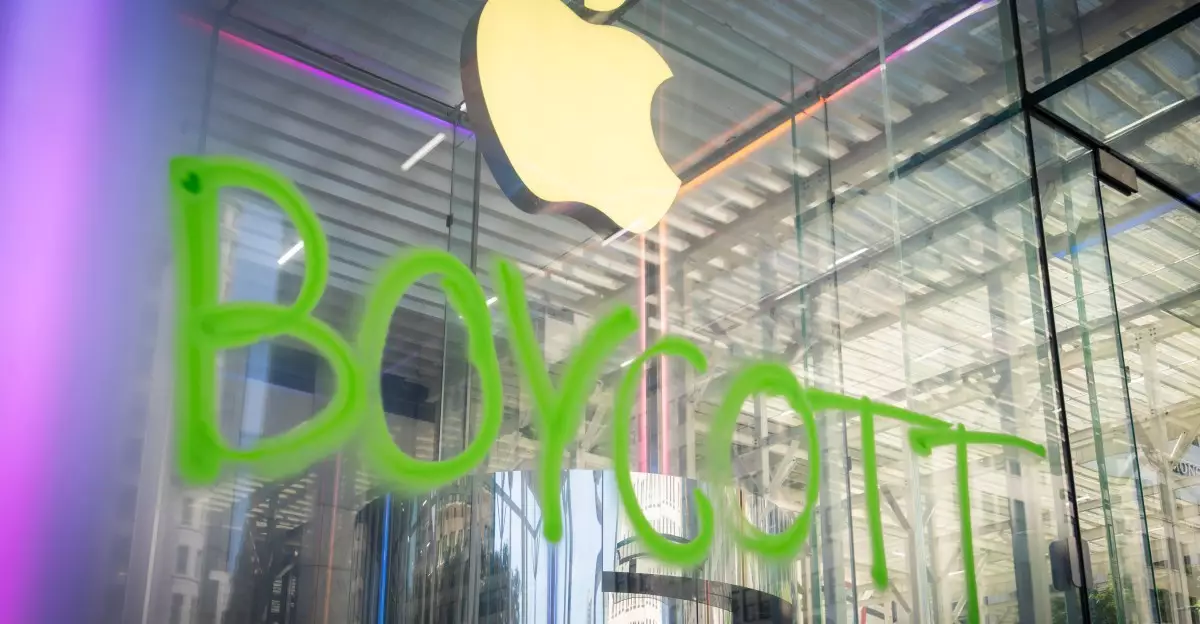In recent years, a remarkable contradiction has emerged within the realm of environmentally conscious corporations: they loudly proclaim support for climate initiatives while their actions, paradoxically, undermine these very goals. Big Tech giants like Apple, Google, and Microsoft have built their brands around innovation, but their environmental promises often resemble shiny façade—attractive yet superficial. Their public relations campaigns tout sustainability and climate pledges, yet behind the scenes, their practices reveal a different truth. A closer look exposes the disappointing chasm between their words and deeds, and it raises questions about the sincerity of their commitments.
Protests such as those led by Extinction Rebellion aim to spotlight this dissonance. When activists spray-paint slogans like “Tim + Trump = Toxic” on Apple stores or shout accusations of climate hypocrisy, they draw crucial attention to discrepancies between corporate messaging and actual impact. These acts of civil disobedience challenge the assumption that tech companies are genuinely committed to environmental ethics. Instead, they reveal a pattern of performative activism, where corporate social responsibility becomes a marketing tool rather than a moral imperative.
The late 20th and early 21st centuries saw corporations increasingly adopt the language of sustainability. They signed voluntary agreements, launched green initiatives, and claimed to support the Paris Agreement. But aggressive investments in fossil fuels, energy-intensive AI, and expanding data centers tell a starkly different story. Google, Microsoft, and Apple’s increasing carbon footprints—despite their lofty claims—show that economic growth and environmental responsibility often remain at odds. Their donations, lobbying efforts, and partnerships frequently align with policies that compromise climate progress, especially when those policies favor fossil fuels or roll back regulations.
The Illusion of Ethical Leadership in Tech
Apple’s chief executive Tim Cook often appears as a climate hero, emphasizing the company’s commitment to sustainability crisis solutions. Yet, when executives from these same companies publicly endorse or support political figures whose policies directly threaten the climate, it exposes a troubling inconsistency. The support extended to leaders like Donald Trump, whose administration notably rolled back environmental protections and promoted fossil fuels, reveals a disturbing willingness to prioritize profits or political alliances over planetary health.
The symbolism of protests—whether spray-painting slogans or staging sit-ins—serves an essential purpose: to demand accountability. Activists argue that corporations cannot simply frame themselves as environmental saviors while quietly funding campaigns or policies that undermine global climate efforts. The contradiction is glaring: supporting climate action publicly, yet enabling climate denial and environmental rollback privately. It’s a betrayal of public trust, especially when companies like Apple continue to profit from products demanding significant energy and resource input.
Furthermore, the environmental costs extend beyond direct emissions. The AI industry’s relentless growth, fueled by abundant energy consumption, exemplifies how innovation can be a double-edged sword. Google and Microsoft’s increasing carbon footprints highlight that technological advancement, if not properly managed, can aggravate climate issues instead of alleviating them. This transformation from environmental pioneers to paradoxical contributors underscores the urgent need for authentic corporate accountability.
Are We Witnessing a Crisis of Integrity or a Reckoning of Reality?
The protests and campaigns orchestrated by groups like Extinction Rebellion serve as a moral wake-up call. They challenge society to scrutinize the true environmental integrity of corporations we trust. It is no longer enough for companies to issue vague green statements or adopt token initiatives. Genuine change requires transparency, accountability, and a willingness to make sacrifices for the planet’s future.
In a world increasingly driven by digital infrastructure, the true cost of our technological pursuits often remains hidden. The heavy energy consumption of data centers, AI development, and cloud services hints at a looming crisis—one that corporate promises of sustainability are ill-equipped to address. As consumers, activists, and policymakers grapple with these realities, it becomes clear that superficial activism will no longer suffice. Authentic progress demands systemic change and unwavering corporate commitment.
The question remains: will corporations like Apple, Google, and Microsoft choose genuine climate action over glossy public relations? Or will their rhetoric continue to mask a harsher truth? The ongoing protests serve as a stark reminder that the time for hollow promises has long passed. The world demands transparent and meaningful leadership—yet whether this demand will be met hinges on the courage of these corporations to prioritize the planet over profits and political expediency.

